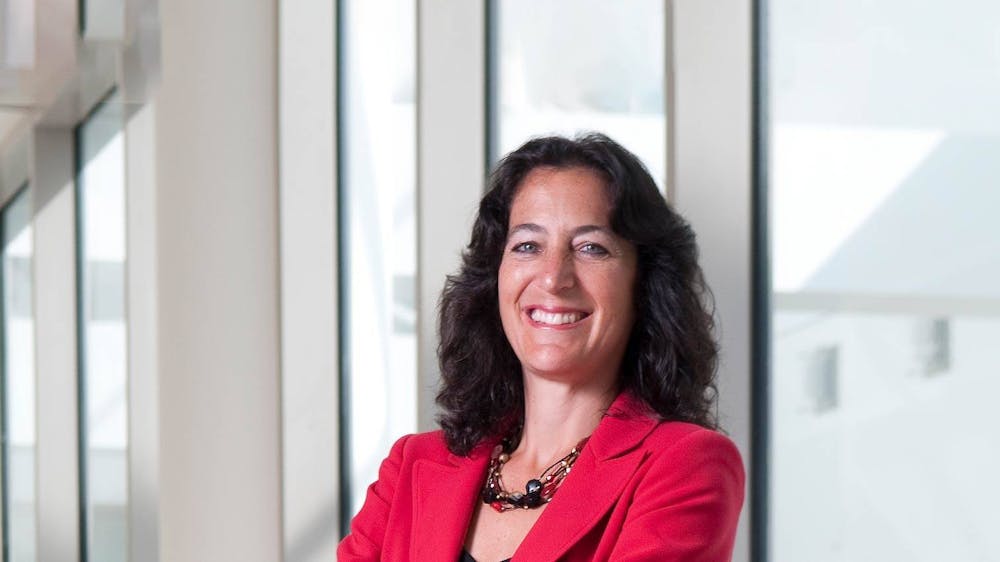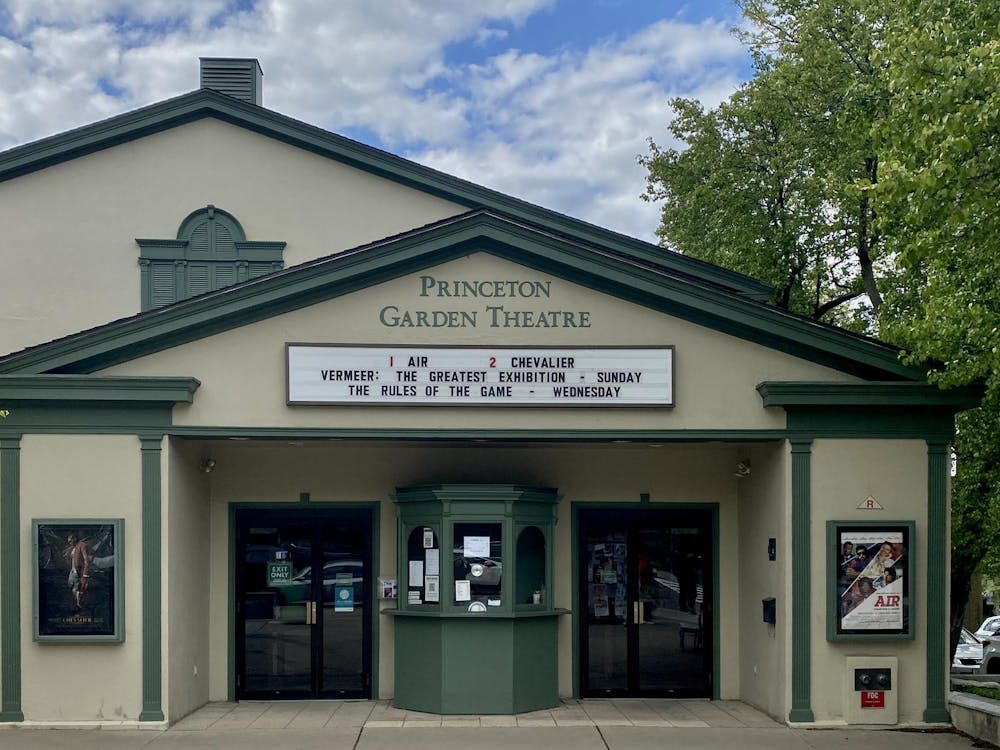On Thursday, April 30, communications and information innovator Andrea Goldsmith became the first woman to receive the Marconi Prize, now in its 45th year. The Prize recognizes her “pioneering contributions to the theory and practice of adaptive wireless communications.”
Effective Sept. 1, Goldsmith will assume the role of Dean of the School of Engineering and Applied Science (SEAS) and join the faculty as the Arthur LeGrand Doty Professor of Electrical Engineering. She is currently the Stephen Harris Professor of Engineering at Stanford University.
Awarded by the Marconi Society — founded in honor of Italian inventor Guglielmo Marconi — the Marconi Prize is widely considered the highest honor in telecommunications research, given to one or two individuals a year for “a significant and impactful scientific discovery or innovation that changed millions of lives.”
Goldsmith’s innovations have led to critical advances in the performance of cellular and WiFi networks, ensuring reliable connectivity amid dramatic changes in network conditions.
“[These changes] can happen, for example, when you drive around a building that blocks the signal your cell phone is sending to its cellular base station, or when your neighbor turns on their Wi-Fi and it interferes with your Wi-Fi network,” she explained.
The ever-changing nature of such wireless channels introduces bottlenecks, which can then lead to dropped calls, poor quality signals, frozen screens, and significant delays in waiting for the signal quality to improve.
Goldsmith developed a technique known as adaptive modulation, which matches the speed at which a wireless device sends data to the maximum data rate that its channel can support, given its quality — also known as the channel’s fundamental capacity limit. Her technique guarantees reliable communication, regardless of the channel’s relative quality.
Throughout her career, Goldsmith has worked to determine the fundamental capacity limit of wireless systems, even as they have become increasingly complex. She has also developed practical adaptive schemes to achieve their limits.

Vint Cerf, chair of the Marconi Society, said in the announcement, “Andrea has enabled billions of consumers around the world to enjoy fast and reliable wireless service, as well as applications such as video streaming and autonomous vehicles that require stable network performance.”
In addition to her technical innovations, the society recognized Goldsmith’s “leadership to radically improve diversity and inclusion in engineering” among underrepresented groups.
In a video interview with Cerf, Goldsmith described her undergraduate experience at the University of California, Berkeley in the 1980s, when there were “no women professors” in the department of electrical engineering and “very few women students.”
Even though she finds the needle has moved “somewhat” in the profession, Goldsmith said she had once hoped the field would be “far more diverse” than it is today. According to her, the average number of female professors in engineering schools across the country stands at about 17 percent, with the average number of female engineering students hovering around 21 percent.

At the SEAS, there are only 29 female engineering faculty members, among a total faculty of 164. Women constitute 17.7 percent of engineering professors and lecturers, according to the faculty directory.
Nationally, for the fall of 2015, women constituted 15.7 percent of tenured or tenure-track engineering faculty at universities across the U.S., according to a study by the American Society for Engineering Education.
“We have a long way to go to see the percentage of women and under-represented groups in faculty and students commensurate with their percentages in the general population, which is what we should strive for,” she said.
As the incoming dean, Goldsmith said she looks forward to learning the successes and challenges the University has encountered in its own efforts to recruit and retain diverse students and faculty in engineering.
“The anticipated growth in engineering provides an opportunity to bring in a large cohort of diverse faculty and students,” she added. “Assuming we can be successful in increasing the percentage of diverse faculty and students, we must ensure they experience an inclusive climate that supports people in an equitable manner, so that they can achieve their full potential.”
The crucial first step to diversifying the field, according to Goldsmith, is to recognize the implicit biases that discourage underrepresented groups from pursuing the profession in the first place and staying in it long-term. In order for engineering fields to thrive, she believes, “we must attract and retain diverse people, as diverse ideas lead to identifying important problems to solve, and coming up with creative ways to solve them.”
“I cheer loudly for every diverse person whose accomplishments are recognized with an award, or great job, or promotion, because breaking through these barriers shows the next generation of diverse engineers that there is a path for them to be successful in this profession as well,” she wrote in an email statement to The Daily Princetonian.
“So I hope that me being the first woman to win this award might inspire more women to pursue a career in engineering, and inspire more recognition for the many diverse engineers that have contributed to the wireless and networking technologies we use today,” she continued.
While Marconi Fellows are awarded $100,000 in prize money, Goldsmith has elected to donate the entirety of her honorarium back to the society.
She hopes her donation will support initiatives in diversity and technology, from sponsoring awards that will “recognize early-career diverse engineers who have made important contributions to the profession,” to offering seed grants that can serve as catalysts for “innovations in wireless technology that can make it more reliable, higher speeds, better reach, and better able to serve people in rural communities at low cost.”
In light of COVID-19, Goldsmith said it is gratifying to see the information technologies she developed supporting the world, as everything from business to education has moved almost entirely online.
Even so, the limitations of today’s technology have been laid bare, she admitted, with the all-too-ubiquitous “your Internet connection is unstable” messages she sees during her online lectures.
“That might be due to interference in my Wi-Fi signal, or significant activity on the backbone network at that moment, or a myriad of other factors,” she explained. “The need to increase the reliability of our information technology so that it always works, delivering both high performance and high reliability, is still not possible.”
Perhaps just as critical, in her view, is the pressing need to close the digital divide as people who lack access to high-bandwidth connectivity see their ability to work, learn, and socialize severely compromised.
Regarding the development of infrastructure that can provide universal high-bandwidth connectivity, both across the country and around the world, Goldsmith said, “There is much work ahead.”
Goldsmith is also the co-founder and former chief technology officer of Plume WiFi and Quantenna Communications. Additionally, she is a member of the National Academy of Engineering and the American Academy of Arts and Sciences and holds 29 patents.
Goldsmith has also served as chair of the Institute of Electrical and Electronics Engineers’ Ad Hoc Committee on Diversity, Inclusion and Ethics, which led to the organization adopting its first-ever diversity statement.
At the University, Goldsmith replaces former SEAS Dean Emily A. Carter, who left to become Executive Vice Chancellor and Provost at the University of California, Los Angeles.








